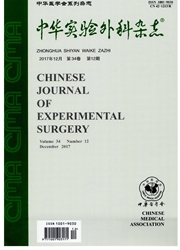

 中文摘要:
中文摘要:
目的观察微小RNA-200c(miR-200c)对膀胱癌细胞T24增殖和细胞周期的影响并探讨其机制。方法运用实时定量聚合酶链反应(Real-time PCR)技术检测膀胱癌5个细胞株中miR-200c的表达水平。借助细胞转染技术,将miR-200c模拟物(mimics)及无义对照序列转染处于对数生长期的膀胱癌T24细胞,分别构建miR-200c过表达(MU组)及阴性对照组(NC组),并通过Real-time PCR技术进行验证转染效率。用细胞计数试剂盒(CCK-8)检测两组细胞转染24、48及72 h的细胞增殖率,流式细胞术观察细胞周期分布变化,Western blot法检测细胞周期相关蛋白表达水平的变化。 结果(1)miR-200c在膀胱癌细胞株EJ(13.204±0.946)、T24(18.259±0.776)、253J(8.333±0.543)、5637(6.594±0.326)、RT4(11.348±0.513)中表达量均显著高于正常尿路上皮细胞SV-Huc (1.053±0.078),差异有统计学意义(P=0.000)。(2)MU组在转染miR-200c mimics 48、72 h后吸光度值(1.485±0.131、2.396±0.110)均显著高于NC组(1.158±0.182、1.893±0.216),差异有统计学意义(P=0.050、0.023)。(3)与NC组比较,MU组细胞周期分布G1期比例下降[(54.65±0.60)%比(64.51±0.63)%,P=0.004],S期比例上升[(31.43±0.77)%比(27.99±0.53)%,P=0.034],G1/S比值下降(1.74±0.06比2.31±0.07,P=0.013)。(4)转染miR-200c后细胞周期蛋白依赖激酶(CDK)2(1.44±0.10比0.86±0.15,P=0.005)、CDK4(3.05±0.17比1.24±0.07,P=0.001)、E2F3(1.81±0.22比1.18±0.20,P=0.021)表达水平均升高。 结论 miR-200c通过调控细胞周期相关蛋白促使膀胱癌T24细胞周期由G1向S期转变,从而促进膀胱癌细胞增殖。
 英文摘要:
英文摘要:
ObjectiveTo investigate the influence of microRNA (miRNA, miR)-200c on cell proliferation and cell cycle in bladder cancer T24 cells and the preliminary mechanism. MethodsThe expression of miR-200c in bladder cancer cell lines was detected using real-time quantitative polymerase chain reaction (Real-time PCR). T24 cells were transfected with miR-200c mimics (MU group) or nonsense control (NC group) individually to generate negative control group and over-expression group. Then cell proliferation was assessed using cell counting kit-8 (CCK-8) kits at 24, 48 and 72 h while cell cycle distribution was detected by flow cytometry. Finally, Western blotting was applied to detect the levels of cell cycle-related proteins. ResultsMiR-200c was up-regulated in bladder cancer cell lines EJ (13.204±0.946), T24 (18.259±0.776), 253J (8.333±0.543), 5637 (6.594±0.326), RT4 (11.348±0.513) as compared with normal urothelial cell line SV-Huc (1.053±0.078, P=0.000). MiR-200c mimics promoted cell proliferation at 48 and 72 h after transfection [(1.485±0.131 and 2.396±0.110) vs. (1.158±0.182 and 1.893±0.216), P=0.050, P=0.023] and induced G1/S checkpoint release (P=0.013). Meanwhile, the protein levels of cyclin-dependent kinase (CDK)2 (1.44±0.10 vs. 0.86±0.15, P=0.005), CDK4 (3.05±0.17 vs. 1.24±0.07, P=0.001), E2F3 (1.81±0.22 vs. 1.18±0.20, P=0.021) were upregulated after transfection. ConclusionMiR-200c promotes cell proliferation and induces G1/S transition in bladder cancer T24 cell lines via regulating cell cycle-related proteins.
 同期刊论文项目
同期刊论文项目
 同项目期刊论文
同项目期刊论文
 期刊信息
期刊信息
